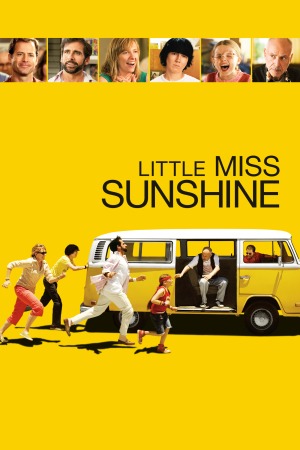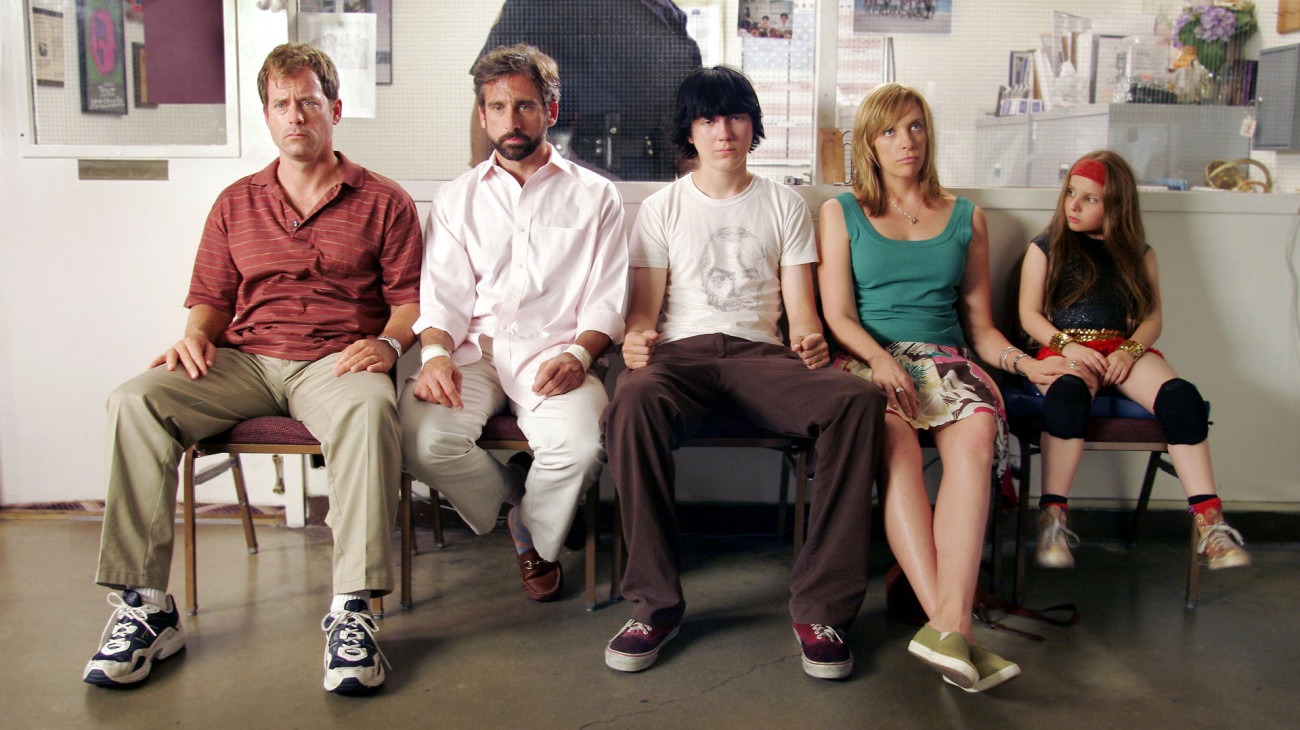
Welcome to hell
If there's one film plot that's been overdone more than the dysfunctional family, it's the road-trip. Which makes Michael Arndt, the writer of Little Miss Sunshine a holy fool: the only thing more shocking than the idea of making a film cobbled together from those two misbegotten genres is how extraordinarily successful it is.
And while I do not credit Arndt exclusively with this success - indeed, with a lesser director and weaker actors, this could have been an unending exercise in pain - I am still left with the idea that this film works first and above all because it has something rare in American film, rarer still in American independent film: a loving and generous script.
The story concerns the Hoover family: Richard, a failed motivational speaker; Sheryl, an indifferent homemaker; Richard's father, an over-sexed heroin addict; Sheryl's brother Frank, a suicidal Proust scholar; Dwayne, Sheryl's son (there is a quiet implication that he is from an earlier marriage) who has taken a vow of silence until he becomes a fighter pilot, the result of reading Nietzsche; and above all Olive, an eight-year-old with Coke bottle glasses and a little pot belly whose only goal in life is to win a beauty pageant.
In the abstract, this looks more like a menagerie of grotesques, and to a certain degree that's just what they are at the start. But as the story picks up (Olive has received a last-minute chance to compete in the Little Miss Sunshine pageant in Redondo Beach, CA, and it's not convenient for anyone to stay behind), every one of them is offered a chance to show the audience and each other a more humane and loving side. This is balanced out by a rather brave willingness to show how they're all, in their own way, neurotic messes, and how that makes them more rather than less lovable.
Of course, this could come off as programmatic and saccharine in the wrong hands, which is why Arndt is so very lucky that his script was snatched up by married directors Jonathan Dayton and Valerie Faris, music video and commercial veterans making their first feature. Wisely, Dayton and Faris take the "Spike Jonze" approach to graduating out of videos, rather than the "everyone else" approach; Little Miss Sunshine is a slender film and lathering it in flashy edits and whirling camerawork would suffocate the characters. Instead, they adopt a very hands-off style, setting up every shot to showcase the actors and the dialogue. The closest the film has to an intrusive authorial voice is the cluttered mise en scène - except no, I shouldn't say "intrusive," that implies that it's wrong somehow, and the crowded suburban milieu of the film is exactly right, letting us know exactly who these people are in one quick stroke.
Most of all, credit belongs to the actors, one of the finest casts assembled this year. If there's a standout, it's certainly Abigail Breslin, the ten-year-old actress playing Olive. The film is brave in that it doesn't shy away from making a little girl the subject of sometimes ungentle mockery, and Breslin plays her character pefectly to show us both the sweet childish ambition, and the rather horrifying desperation, and most amazingly of all, the knowledge that she, Olive, is never going to achieve all she wants from life. It's a layered performance that would be a credit to an adult, but her age makes it all the more impressive.
The rest of the cast is pretty great in their own turn. Steve Carell's Frank is a remarkable comic study: it's well-reported that he built the character's unusual run from scratch, and it's amazing how clearly just that run shows how uncomfortable he is within his body - this is a man who is only at ease in a state of pure mind, and like the author he studies, he doesn't know how to be a person. Alan Arkin as Olive's grandpa and coach, in his best role in ages, gets perhaps the broadest character to play with, but he keeps it from turning into a cariacture, and he also gets the sweetest moments in the film, when he is alone with his granddaughter. Paul Dano turns what could have easily been a cartoon teenager into a real human, and he does it all without speaking. Greg Kinner's Richard is perhaps the fullest character on the page, and he takes advantage of that, making a classic American failure, something like William H. Macy could play if you didn't always have the slight sense that Macy wants you to hate his character (and there's little doubt this is deliberate - look at the role that men named Stan Grossman play here and in Fargo). Toni Collette, as Sheryl, has perhaps the only underwritten character, her function mainly to keep everyone else from flying apart; lucky then that she is such a naturally great actress as to give the role a sense of matriarchal fullness that it almost doesn't deserve.
And while none of these actors save Carrell is by trade a comic performer, Little Miss Sunshine thrives by giving them all a chance to exercise the most flawless comedic timing of any American film this year. It shouldn't be hard for sentiment and satire to exist in tandem, but they rarely do in the cinema, and that is one of this film's greatest achievements: it is extraordinarily funny and sweet. This is the sort of thing that independent movies get to do that studio films with their desperate calculation can never imagine: it's palpable how much everyone involved wanted to do this. They made a movie because they had a hell of a good time doing it, and that sort of enthusiasm leaps right out of the screen to effortlessly take hold of the audience, as well.
And while I do not credit Arndt exclusively with this success - indeed, with a lesser director and weaker actors, this could have been an unending exercise in pain - I am still left with the idea that this film works first and above all because it has something rare in American film, rarer still in American independent film: a loving and generous script.
The story concerns the Hoover family: Richard, a failed motivational speaker; Sheryl, an indifferent homemaker; Richard's father, an over-sexed heroin addict; Sheryl's brother Frank, a suicidal Proust scholar; Dwayne, Sheryl's son (there is a quiet implication that he is from an earlier marriage) who has taken a vow of silence until he becomes a fighter pilot, the result of reading Nietzsche; and above all Olive, an eight-year-old with Coke bottle glasses and a little pot belly whose only goal in life is to win a beauty pageant.
In the abstract, this looks more like a menagerie of grotesques, and to a certain degree that's just what they are at the start. But as the story picks up (Olive has received a last-minute chance to compete in the Little Miss Sunshine pageant in Redondo Beach, CA, and it's not convenient for anyone to stay behind), every one of them is offered a chance to show the audience and each other a more humane and loving side. This is balanced out by a rather brave willingness to show how they're all, in their own way, neurotic messes, and how that makes them more rather than less lovable.
Of course, this could come off as programmatic and saccharine in the wrong hands, which is why Arndt is so very lucky that his script was snatched up by married directors Jonathan Dayton and Valerie Faris, music video and commercial veterans making their first feature. Wisely, Dayton and Faris take the "Spike Jonze" approach to graduating out of videos, rather than the "everyone else" approach; Little Miss Sunshine is a slender film and lathering it in flashy edits and whirling camerawork would suffocate the characters. Instead, they adopt a very hands-off style, setting up every shot to showcase the actors and the dialogue. The closest the film has to an intrusive authorial voice is the cluttered mise en scène - except no, I shouldn't say "intrusive," that implies that it's wrong somehow, and the crowded suburban milieu of the film is exactly right, letting us know exactly who these people are in one quick stroke.
Most of all, credit belongs to the actors, one of the finest casts assembled this year. If there's a standout, it's certainly Abigail Breslin, the ten-year-old actress playing Olive. The film is brave in that it doesn't shy away from making a little girl the subject of sometimes ungentle mockery, and Breslin plays her character pefectly to show us both the sweet childish ambition, and the rather horrifying desperation, and most amazingly of all, the knowledge that she, Olive, is never going to achieve all she wants from life. It's a layered performance that would be a credit to an adult, but her age makes it all the more impressive.
The rest of the cast is pretty great in their own turn. Steve Carell's Frank is a remarkable comic study: it's well-reported that he built the character's unusual run from scratch, and it's amazing how clearly just that run shows how uncomfortable he is within his body - this is a man who is only at ease in a state of pure mind, and like the author he studies, he doesn't know how to be a person. Alan Arkin as Olive's grandpa and coach, in his best role in ages, gets perhaps the broadest character to play with, but he keeps it from turning into a cariacture, and he also gets the sweetest moments in the film, when he is alone with his granddaughter. Paul Dano turns what could have easily been a cartoon teenager into a real human, and he does it all without speaking. Greg Kinner's Richard is perhaps the fullest character on the page, and he takes advantage of that, making a classic American failure, something like William H. Macy could play if you didn't always have the slight sense that Macy wants you to hate his character (and there's little doubt this is deliberate - look at the role that men named Stan Grossman play here and in Fargo). Toni Collette, as Sheryl, has perhaps the only underwritten character, her function mainly to keep everyone else from flying apart; lucky then that she is such a naturally great actress as to give the role a sense of matriarchal fullness that it almost doesn't deserve.
And while none of these actors save Carrell is by trade a comic performer, Little Miss Sunshine thrives by giving them all a chance to exercise the most flawless comedic timing of any American film this year. It shouldn't be hard for sentiment and satire to exist in tandem, but they rarely do in the cinema, and that is one of this film's greatest achievements: it is extraordinarily funny and sweet. This is the sort of thing that independent movies get to do that studio films with their desperate calculation can never imagine: it's palpable how much everyone involved wanted to do this. They made a movie because they had a hell of a good time doing it, and that sort of enthusiasm leaps right out of the screen to effortlessly take hold of the audience, as well.
Categories: comedies, indies and pseudo-indies, quirkycore, travelogues, warm fuzzies






